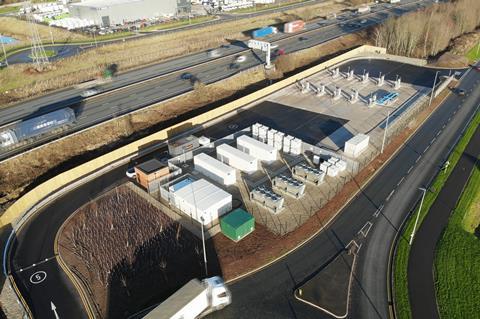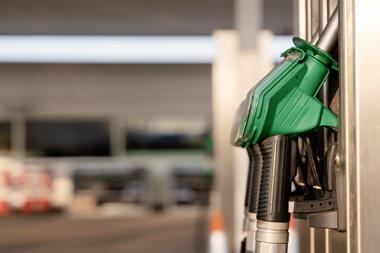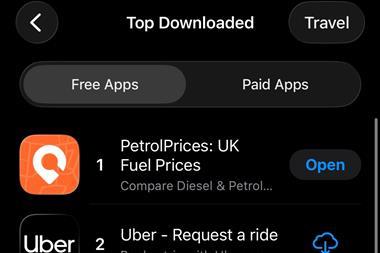- UK-wide hydrogen trials to start from mid 2022 to decarbonise fleets.
- By 2025, CNG Fuels plans to allocate 100 acres of its land to public access hydrogen HGV refuelling.
- New subdivision, ‘HyFuels’ will lead the trials to identify best technologies and inform government, industry and existing customers on best hydrogen pathways.
- HGVs account for 16% of UK transport emissions, despite representing just 5% of total road miles on UK roads.
- Renewable biomethane made from food waste remains the lowest carbon and most cost-effective solution for HGVs today, cutting emissions by over 85% and lifetime costs by 30-40%.
- CNG Fuels is UK’s largest supplier of alternative low-carbon fuels for HGVs and has plans for 60 low carbon refuelling stations by 2026, supporting biomethane today and other low-carbon fuels in future as they develop.

CNG Fuels, the UK’s largest supplier of alternative low-carbon fuels for HGVs, has announced plans to host hydrogen fuel trials across its rapidly expanding UK network of public access biomethane refuelling stations to support the future decarbonisation of HGVs.
A new branch of the company, HyFuels, has been established to identify the best hydrogen production pathways and infrastructure solutions for HGVs so it can support customers in adopting hydrogen quickly and easily when it becomes commercially viable. The first trials are due to begin in mid-2022, with the company currently in discussions with international partners and undertaking feasibility studies across its upcoming development sites. By 2025, the company plans to allocate 100 acres of its land to public access hydrogen refuelling.
Philip Fjeld, CEO of CNG Fuels, said: “HGVs alone account for 5% of all UK emissions, making their decarbonisation one of the single most important things the UK can do to meet our net zero ambitions.
“Renewable biomethane is and will continue to be the most effective decarbonisation solution for heavy transport for many years. However, we have launched HyFuels to ensure we are ready to support our customers’ journey to a multi-fuel future as new technologies become commercially viable and the fuel readily available.”
The company says HGV fleet operators face a significant challenge to rapidly switch to more sustainable fuel sources to meet climate targets. HGVs account for 16% of UK transport emissions, despite representing just 5% of total road miles on UK roads, according to Department for Transport data.
For high-mileage HGVs, CNG Fuels points to renewable biomethane as being the lowest-carbon, most cost-effective alternative fuel today, cutting emissions by more than 85% and lifetime costs by 30-40% compared to diesel. It says mid-weight trucks (<26 tonnes) will be among the first to be commercially viable for new technologies such as hydroge; and that the trials carried out by HyFuels will be particularly important for hauliers operating mid-weight trucks, helping them to navigate challenging decarbonisation targets proposed by government, including a potential ban on diesel engines by 2035.
CNG Fuels already supports major fleets with 100% renewable biomethane sourced from food waste and manure across its UK-wide network of public access refuelling stations. Major brands already on board include the John Lewis Partnership, Waitrose, Hermes, Warburtons, and Royal Mail.
Demand for the fuel has been doubling every year for the past five years. CNG Fuels expects that with the rapid expansion of its UK wide network, this will continue to accelerate with around 10% of the UK’s high-mileage HGV fleet running on Bio-CNG by 2025.
However, in future, other low-carbon technologies will start to become more prevalent as technology develops and costs fall. The Committee on Climate Change expects hydrogen-powered HGVs to play a major role in decarbonising freight transport from 2030 onwards and the government’s Net Zero Strategy, released earlier this month, includes a policy to expand trials for zero emissions HGV technologies.
HyFuels says it is already in advanced discussions with major international providers of both hydrogen infrastructure and the fuel to deploy its first trials. Among the first initiatives will be a number of hydrogen-ready mobile refuelling units that are able to quickly deliver hydrogen to refuelling sites on demand.
Findings from the trials will be used to inform government, industry, and existing customers on the effectiveness of different hydrogen solutions and outline key infrastructure considerations for a hydrogen refuelling network. The company is also planning to incorporate the findings into a wider business strategy, with a complete roadmap for companies to switch fleets from diesel to net zero fuels.
CNG Fuels currently operates seven public access bio-CNG refueling stations and plans to open at least 12 more every year from 2022. The company plans to have 60 stations in operation by 2026, supporting the mass adoption of renewable biomethane fuel by fleets across the UK.
Baden Gowrie-Smith, CFO of CNG Fuels and head of hydrogen development for HyFuels, added: “We build our sites with our customers’ future needs in mind, acquiring additional space so we can expand as demand grows. This means up to 30% of our future land will be perfectly placed to deploy multi-fuel trials on some of the busiest haulage routes in the UK. As soon as these technologies are viable, we will be ready to support our customers in adopting the latest and greatest in low-carbon technology. With increasingly aspirational decarbonisation targets set by government, our role is to support fleets in their journey to net zero, making it as simple and affordable as possible.”

































No comments yet